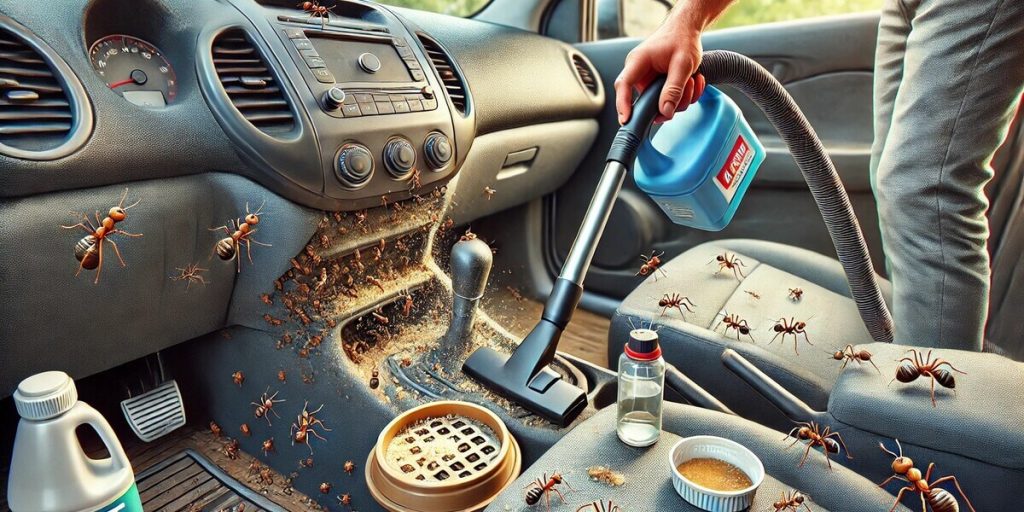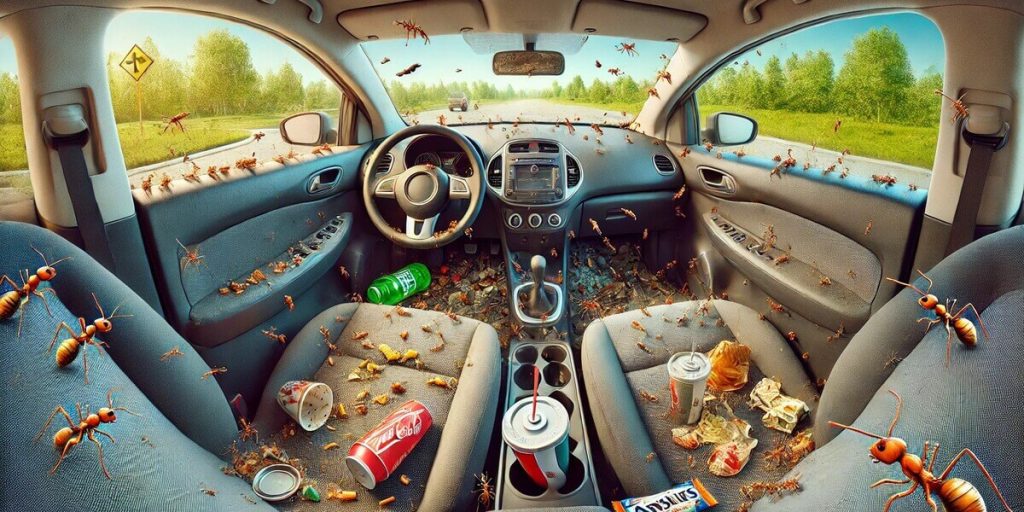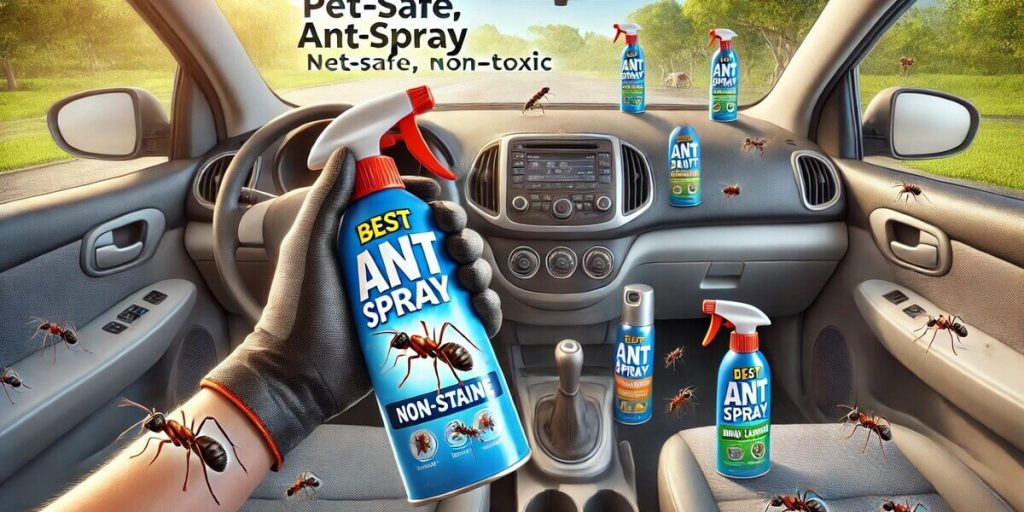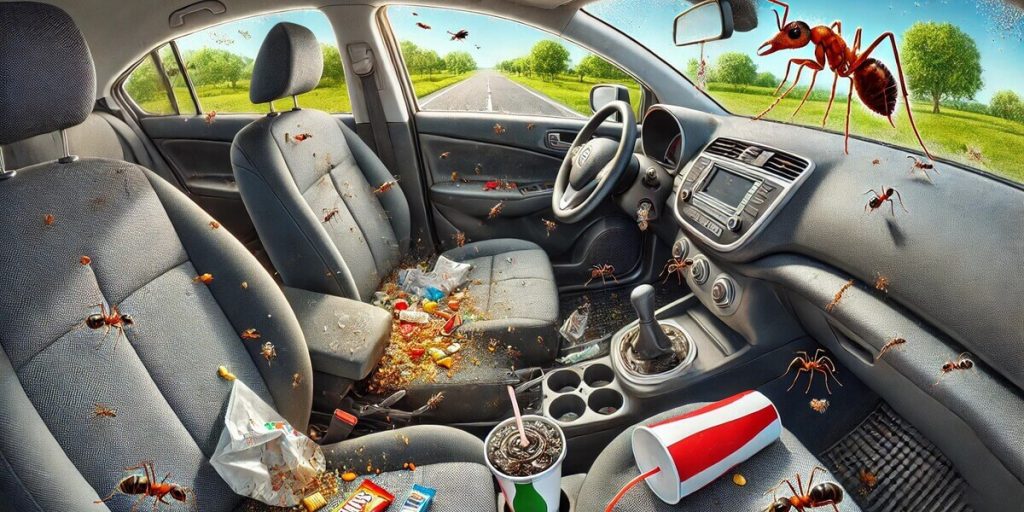Last Updated on February 17, 2025 by Mark S. Taylor
I’ll never forget the day I spotted tiny ants crawling across my dashboard. At first, I thought it was just one or two, but within minutes, I realized my car had turned into an ant highway. If you’re wondering how to get rid of ants in your car, you’re not alone—these sneaky pests can invade for all kinds of reasons, from leftover crumbs to sweet-smelling air fresheners. The good news? You can kick them out fast with the right approach. In this guide, I’ll walk you through the best ways to remove ants from your car, prevent future infestations, and keep your ride pest-free for good.

Contents
Why Are There Ants in My Car?
Ever jumped into your car, only to see ants crawling on the dashboard? It’s annoying—and a little gross. But before you freak out, let’s figure out why they’re there.
Food Crumbs and Spills
Ants love food. Even tiny crumbs or a few drops of soda can attract them. If you’ve ever eaten in your car, those little leftovers might be calling them in.
Sweet Smells Bring Them In
Soda, candy, and even some air fresheners can smell like food to ants. If your car has a sweet scent, ants might mistake it for a snack bar.
Looking for Shelter
Ants don’t just come for food. Hot weather, rain, or cold can drive them inside. If you park near grass or trees, they might see your car as a safe place.
Tiny Openings Let Them In
Ants are small. They can sneak through cracks in windows, vents, or doors. If they keep showing up, they’ve probably found an easy way inside.
Signs You Have an Ant Infestation
A few ants aren’t a big deal. But if they keep coming back, you might have a problem. Here’s what to watch for:
- Ant trails on seats, the dashboard, or the center console.
- Tiny movement near air vents, cup holders, or cracks.
- Dirt or debris left behind by ants.
- A musty or sour smell, which can mean dead ants in hidden spots.
If you see these signs, it’s time to act fast before they take over your car.
Signs You Have an Ant Infestation in Your Car
A few ants here and there might not seem like a big deal. But if they keep coming back—or worse, seem to be multiplying—it’s a sign of a bigger problem. Here’s how to tell if your car has an infestation.
Ants on Your Seats, Dashboard, or Steering Wheel
If you see ants crawling across your dashboard or steering wheel, they’re not just passing through. They’ve found something they like, and they’re coming back for more.
Unusual Movement Near Vents or Cracks
Ants are sneaky. They love hiding in small spaces like air vents, cup holders, or the cracks between your seats. If you notice tiny movements in these areas, they’ve likely made themselves at home.
Dirt Trails or Debris Left Behind
Ants don’t just come alone—they bring their mess with them. If you spot tiny dirt trails or small piles of debris, that’s a clear sign they’ve been busy in your car.
A Strange, Musty Smell
Ever noticed a weird, sour smell in your car that won’t go away? It could be ants—or worse, dead ants—trapped in hidden spots. This happens when an infestation grows and ants get stuck in places you can’t easily reach.
If you recognize any of these signs, it’s time to take action before the problem gets worse. The sooner you deal with it, the easier it will be to get ants out of your car for good.

Best Ways to Get Rid of Ants in Your Car
Getting rid of ants in your car isn’t just about spraying insecticide and hoping for the best. You need a strategy—one that cleans up their food sources, repels them naturally, and blocks their entry points. Here’s how to do it step by step.
Step 1: Clean Thoroughly
Ants are in your car for a reason—food. The first step to kicking them out is taking away their snack supply.
- Vacuum everything—seats, carpets, cup holders, and even under the floor mats. Ants love tiny crumbs.
- Wipe down surfaces with soapy water or a vinegar solution to remove food residue and scent trails.
- Toss out trash and food wrappers. Even an old candy wrapper can attract ants.
💡 Quick Tip: A handheld vacuum works great for reaching tight spots where crumbs hide.
Step 2: Use Natural Ant Repellents
Once your car is clean, it’s time to make it an unwelcome place for ants. Natural repellents can keep them from coming back.
- Cinnamon powder or essential oil—Ants hate the smell, so sprinkle it near entry points.
- Lemon juice spray—Mix lemon juice with water and spritz it around doors and vents. The citrus scent confuses ants.
- Coffee grounds—Place them in small containers near where ants enter. They won’t cross the barrier.
💡 Fun Fact: Ants rely on scent trails to find food. Disrupt their path, and they get lost!
Step 3: Apply Safe Ant Killers
If the infestation is bad, repellents might not be enough. You’ll need an ant killer for cars that’s safe but effective.
- Pet-safe and non-toxic sprays work well if you have kids or pets.
- Bait traps designed for indoor use are great because ants carry the poison back to their colony.
- Diatomaceous earth (food-grade) can be sprinkled in cracks—it dehydrates and kills ants on contact.
💡 Avoid using strong chemical sprays inside your car, as the fumes can be harmful.
Step 4: Seal Entry Points
Now that you’ve cleaned up and removed the ants, it’s time to stop them from coming back.
- Check for cracks around windows, doors, and air vents. Ants can squeeze through the tiniest gaps.
- Use silicone caulk or weather stripping to seal up small openings.
- Avoid parking near anthills, trees, or grassy areas, especially in warm months.
💡 A little prevention goes a long way! Keeping your car clean and sealed up will keep ants out for good.
By following these steps, you can get rid of ants in your car and keep them from coming back. Next, let’s look at some home remedies that can help speed up the process.
Home Remedies for Ants in Your Car
If you prefer natural solutions over store-bought ant killers, you’re in luck! There are plenty of DIY remedies that can help eliminate ants while keeping your car safe for kids and pets. Here are a few tried-and-true methods.
Baking Soda and Sugar Trap
This simple trick works by attracting ants with sugar and killing them with baking soda.
- How to make it: Mix equal parts baking soda and sugar in a small dish.
- Where to place it: Set the mixture near cup holders, door crevices, or under seats where you’ve seen ants.
- Why it works: Ants take the sugary bait back to their colony, and the baking soda disrupts their digestive system.
💡 Fast Fact: Baking soda expands inside ants, killing them naturally.
Borax and Honey Bait
This is one of the most effective home remedies for an ant infestation.
- How to make it: Mix one part borax with three parts honey or syrup.
- Where to place it: Spread small amounts on cotton balls and tuck them into hidden areas in your car.
- Why it works: Ants love the sweet honey, but the borax poisons the colony from the inside out.
💡 Safety Tip: Keep borax away from kids and pets—it can be toxic if ingested.
Essential Oil Spray (Peppermint or Tea Tree Oil)
Ants hate strong scents, and essential oils can help keep them away.
- How to make it: Mix 10 drops of peppermint or tea tree oil with one cup of water in a spray bottle.
- Where to spray it: Around air vents, door seals, and floor mats to disrupt their scent trails.
- Why it works: The strong smell overwhelms ants and forces them to leave.
💡 Bonus: Your car will smell amazing without using chemical air fresheners!
Diatomaceous Earth (Food-Grade)
If you’re dealing with a stubborn infestation, diatomaceous earth (DE) is a natural ant killer that works fast.
- How to use it: Lightly sprinkle food-grade DE in cracks and crevices where ants travel.
- Why it works: DE dehydrates ants on contact, killing them within hours.
💡 Important: Use only food-grade DE, as industrial DE can be harmful to breathe in.
By using these simple home remedies, you can get rid of ants in your car naturally—without exposing yourself to harsh chemicals. Now, let’s explore the best commercial ant sprays if you need a stronger solution.

What Is the Best Ant Spray for Cars?
If you’re dealing with a stubborn ant problem, you might need more than just home remedies. A good ant spray for cars can wipe out the infestation quickly. But not all sprays are safe for enclosed spaces like your car. You’ll want something non-toxic, non-staining, and long-lasting to get the job done without leaving behind harmful fumes or sticky residue.
What to Look for in an Ant Spray for Cars
When choosing an ant spray, keep these key factors in mind:
- Non-Staining Formula – Some sprays leave greasy marks or discolor fabrics. Look for a clear, non-staining option that won’t ruin your car’s interior.
- Long-Lasting Effects – You don’t want ants coming back after a day or two. A good spray should offer residual protection, keeping ants away for weeks.
- Pet & Child-Safe Ingredients – If you have pets or kids, go for natural or low-toxicity sprays to keep your car safe.
- Odor-Free or Pleasant Scent – Strong chemical smells can make driving unbearable. Many natural sprays use essential oils like peppermint or citrus, which smell much better.
Top Ant Sprays for Cars (Tried & Tested)
Here are some of the best commercial ant sprays that work well in cars:
1️⃣ Terro Ant & Roach Killer – A fast-acting, non-staining spray that kills ants on contact and provides long-term control. It’s safe for indoor use, making it a solid choice for cars.
2️⃣ Wondercide Indoor Pest Control Spray – A natural, pet-safe spray made with essential oils like cedarwood and lemongrass. It repels ants without toxic chemicals, plus it smells fresh.
3️⃣ Raid Ant & Roach Killer 26 – A trusted name in pest control, this spray kills ants instantly and leaves a protective barrier to keep them from coming back. However, it has a strong scent, so use it sparingly.
4️⃣ MDXconcepts Organic Pest Spray – If you prefer an eco-friendly option, this plant-based spray is a great pick. It contains vinegar, essential oils, and soap to kill and repel ants naturally.
💡 Quick Tip: Always spray in a well-ventilated area and wipe down surfaces after applying to avoid residue buildup.
How to Use Ant Spray Safely in Your Car
- Target entry points – Spray along doors, vents, under seats, and floor mats, where ants are most active.
- Don’t overdo it – Too much spray can make your car smell overpowering. A light mist is enough.
- Let it air out – If using a chemical spray, leave your windows down for a while to let fumes dissipate.
With the right spray, you can get rid of ants in your car fast and keep them from coming back. Now, let’s talk about how to prevent future infestations so you don’t have to deal with this again!
How to Prevent Ants in Your Car
Getting rid of ants is one thing, but keeping them from coming back? That’s the real goal. Ants are persistent, but a few simple habits can help you keep your car ant-free. Here’s what you can do.
1. Avoid Eating in Your Car
We’ve all grabbed a quick snack on the go, but even the tiniest crumbs can attract ants. If you must eat in your car, make sure to clean up immediately and throw away any food wrappers.
💡 Fast Fact: Ants can detect food from far away, especially sweet or greasy snacks.
2. Vacuum and Wipe Down Surfaces Regularly
A clean car is an ant-proof car.
- Vacuum carpets, seats, and cup holders to remove crumbs.
- Wipe down dashboards, door panels, and consoles with soapy water or vinegar to erase scent trails.
- Shake out floor mats often, especially if you park in areas with lots of dirt and leaves.
💡 Pro Tip: Keeping a mini vacuum in your trunk makes quick cleanups easy!
3. Store Snacks and Drinks in Sealed Containers
If you keep snacks in your car, store them in airtight containers. Open chip bags, candy wrappers, or even a forgotten soda bottle can lure ants in.
💡 Even an empty coffee cup left overnight can be enough to attract them!
4. Be Mindful of Where You Park
Where you park matters. If you leave your car near trees, grassy areas, or anthills, ants are more likely to find their way inside. Whenever possible, choose paved spots away from nature.
💡 If you notice ants crawling on your tires, they’re probably making their way inside. Move your car to a different spot and check for an infestation!
5. Use Natural Repellents
Certain smells keep ants away—and you can use that to your advantage.
- Place small sachets of dried bay leaves, cloves, or cinnamon sticks in your glove box or under seats.
- A few drops of peppermint or citrus essential oil on cotton balls can deter ants.
- Sprinkling diatomaceous earth (food-grade) around entry points can block ants from coming inside.
💡 Bonus: These natural repellents also make your car smell fresh!

What Attracts Ants to Your Car?
Ants don’t invade your car for no reason. They follow scent trails, searching for food, water, and shelter. Here’s what might be bringing them in.
1. Residual Smells from Spills
Even if there’s no visible food, spills from soda, coffee, or juice can leave behind sugary residues that ants love. If you’ve ever had a spill, wipe it up with soapy water and consider using a disinfectant wipe to remove any lingering scent.
2. Sticky Residue from Candy or Gum
Dropped a piece of gum? Left a sticky candy wrapper in the door pocket? Ants can find and feast on even the smallest sugary leftovers. A quick wipe-down of your cup holders, door handles, and seat crevices can prevent them from sniffing out a treat.
3. Moisture Buildup in Air Conditioning Systems
Ants are attracted to moisture, especially on hot days. Condensation from your air conditioning vents can create a damp environment they like. To fix this:
- Run your AC on “vent mode” for a few minutes before shutting off your car to reduce moisture buildup.
- Check for leaks around windows and door seals.
💡 A dry car is a less inviting home for ants!
By following these tips, you can stop ants before they ever become a problem. Keep your car clean, store food properly, and use natural deterrents to make sure ants stay out for good! 🚗🐜
FAQs About Ants in Cars
Q: Can ants damage my car?
No, ants don’t damage your car’s engine or parts. However, they can nest in vents, chew on wires, or cause distractions while driving, making them a nuisance.
Q: Will ants go away on their own?
Not usually. Ants stay as long as they find food, moisture, or shelter in your car. Removing crumbs, spills, and entry points is the best way to get rid of them.
Q: Is it safe to use bug spray inside my car?
Only if it’s non-toxic, pet-safe, and designed for enclosed spaces. Avoid strong chemical sprays, as fumes can linger. Natural repellents like peppermint oil work well.
Q: How do I find where ants are coming from?
Look for ant trails near doors, vents, seats, or under the dashboard. Follow their path to find their entry point and use baits, repellents, or sealants to stop them.
Q: Can ants live in car engines?
Rarely, but they might nest in warm areas like air filters or battery compartments. If you see ants near your hood, inspect for a nest and move your car to a new spot.
My Final Thoughts on
If you’re looking for a quick, effective way to get rid of ants in your car, could be a great choice. It works well for those who want fast results without harsh chemicals. However, if you prefer a completely natural solution, you might want to explore other options. From my experience, this product does the job, but keeping your car clean is just as important to stop ants from coming back!
